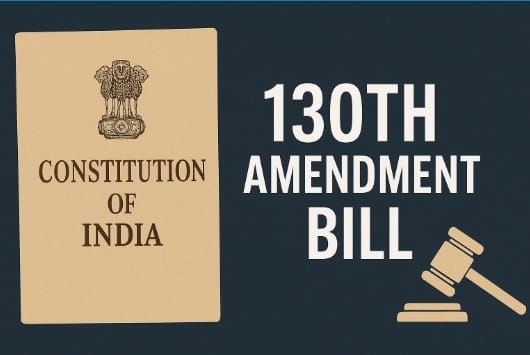
Introduction
On August 20, 2025, Minister of Home Affairs Amit Shah introduced the Constitution (One Hundred and Thirtieth Amendment) Bill, 2025 in Parliament. Consequently, The bill represents a bold and contentious step in the history of the Constitution of India, as it looks to bring a measure of political accountability. The Bill proposes that if the Prime Minister, a Chief Minister, or any other minister spends 30 consecutive days in custody for serious crimes, they will automatically lose office even without a formal conviction.
As a result, the introduction of the bill has ignited strong national debate. Proponents laud it as a blunt measure necessary to obfuscate the criminalization of politics and rebuild popular trust in politics. On the other hand, critics of the measure argue it goes against the presumption of innocence and opens political loopholes for the misuse of investigatory agencies to upset opposition governments.
This debate takes on even more significance by examining recent political events, especially the arrest of Delhi’s former Chief Minister Arvind Kejriwal under the excise policy case, which had already raised questions about the real practical and ethical ramifications of a governing authority operating under custody, which makes the bill even timelier.
Constitution (130th Amendment) Bill, 2025
The One Hundred and Thirtieth Constitutional Amendment Bill, 2025 (Bill) was introduced in the Lok Sabha on 20th August 2025. The most significant proposal in the Bill is the automatic eviction from office of a Prime Minister, State Chief Minister, or any Ministers both at the Centre or in State governments, if the Prime Minister, State Chief Minister, or any minister face arrest, are in custody in connection with a serious criminal offence for a prolonged period. The Bill further extends the similar framework to Union Territory of Delhi. Similarly, the government proposes to introduce parallel legislations of the Bill in Puducherry and Jammu & Kashmir.
Grounds for Eviction
A Minister shall cease to hold office if:
- Authorities charge him or her with an offence carrying a maximum penalty of 5 years or more, and—
- He or she has been in custody District for a continuous period of 30 days.
Procedure
- Firstly, for Union Ministers, the President will evict them, on the advise of the Prime Minister. The Minister shall vacate his/her office, unless the Prime Minister advises the President to evict the Minister by the 31st day.
- Similarly, for State Ministers,: The same process applies, with the Governor acting on the advise of the Chief Minister
- n the case of Delhi, however, The President acts on the advise of the Chief Minister.
- Finally,Ministers or Chief Ministers: They have to resign on the 31st day in custody. If they do not resign, their office automatically lapses the following day.
Re-appointment clause
The government may re-induct the same leader into the Cabinet or as PM/CM once he or she is released from custody.
Why This Bill — The Need and Rationale
1. Reducing Criminality in Politics
Historically India has struggled with the criminalization of politics. Currently, under the Representation of the People Act, 1951, as it currently stands, an elected representative may only be disqualified after they are convicted of a crime and also, only if they are sentenced to over two years incarceration.
This loophole allows an elected leader to retain office even while facing serious criminal charges, standing trial, or remaining in police custody.
2. Aligning to the Norms of Civil Service
The government draws an analogy with civil services, where officers face automatic suspension upon arrest, regardless of conviction. Minsters, who have more responsibilities under the Constitution do not have the same immediate suspension. The Bill proposes establishing parity in levels of accountability for ministers to civil service.
3. PM’s Inclusion and What it Signifies for Political Will
In another important step forward, the Home Minister indicated that Prime Minister Narendra Modi personally pushed to ensure that the Prime Minister’s office was to fall under the Bill. This shows that the Act covers even the highest offices of the polity, ensuring no exemption for top leaders.
Legal Background: What Laws Govern Removal So Far?
1. Representation of the People Act, 1951
This is the main law that deals with both the disqualification of elected representatives.
- Under this law, MPs and MLAs can only be disqualified after their conviction for an offence where the minimum sentence is two years longer.
- Mere arrest or custody does not affect their position in office. Politicians can still hold office even while facing criminal charges, as seen in the case of former Delhi CM Arvind Kejriwal.
2. Similarity with Civil Servants accountability
Civil servants face immediate suspension once authorities arrest them. Suspension is automatic and without question, it is not even dependent upon a conviction. This is a precautionary principle, i.e., such suspension helps to ensure the integrity of governance while an investigation is occurring.
Moreover, the government argues, if a minister has a greater public duty, they cannot enjoy immunity, which bureaucrats do not have.
Closing the gap post-130th Amendment- The 130th Amendment Bill, 2025 will align elected representatives with the same standards applied to civil servants.Thus, in the gap between civil accountability and administrative accountability, if a Prime Minister, Chief Minister, or minister is in judicial custody for 30 days without being released, they will be automatically removed from office.
Significance and Influence
- Better Governance
- Lawmakers conceived the bill as a step toward cleaner politics and efficient governance.
- The intention of the bill is to restore public faith in democratic institutions by determining that jailed politicians under serious criminal allegations are not able to govern.
- Supporters of the legislation contend that this reform strengthens accountability at the highest levels of governance.
2.Political Stability versus Rule of Law
Supporters of the bill view it as necessary reform to protect governance from corruption and the abuse of power.
Opposition however contend that it creates a risky precedent because it uses removal from office, before a conviction has been achieved, and this fundamentally can under-cut the presumption of “innocent until proven guilty.”
This tension taps into a central dilemma: Should a minister to be preserved at the expense of individual rights, or should legal protections have priority over political urgency?
3.Precedents and Concerns about Targeting Politically
The opposition argues that the bill could serve as a tool for political weaponization. Since people often accuse central agencies (like the ED or CBI) of acting selectively, many fear that ruling governments may arrange arrests to topple rival state administrations.
Case in Point: Delhi’s Example
Arvind Kejriwal’s arrest in the alleged liquor excise scam exposed a legal loophole—despite being in custody, he remained CM for weeks. The Centre cites this as justification, arguing that “a CM in jail running a government weakens democracy.” Yet, it also raises fears of political misuse, making it a defining precedent behind the 130th Amendment push.
Opposition & Criticism
- Kerala CM Pinarayi Vijayan– Called it a “neo-fascist policy,” claiming that the amendment arms investigative agencies against leaders of the opposition.
- Priyanka Gandhi Vadra– Called it “draconian,” saying that it will give the ruling party the ability to dismiss rivals through false arrests .
- Mamata Banerjee- Said that we are upon a “super-Emergency,” similar to steps we see in authoritarian regimes, with many attacks on civil rights, including rights related to free and fair elections .
- Asaduddin Owaisi– Said it was an attack upon the democratic norms and federalism of the country, and if it were passed, it would make the country a “police state” .
- Other Opposition Voices– Argue that the bill is unconstitutional and undemocratic; because it could further the possible misuse of a law for political gain and movement away from any spirit of free democracy.
Precedents: Important Constitutional Amendments in the Last Few Years
128th Amendment (2023) – Women’s Reservation Bill
Provided for 33% reservation for women in the Lok sabha and the State Assemblies, which has long been need, to establish gender representation .
129th Amendment (2024) – Simultaneous Elections
Enabled “One Nation, One Election” empowering the Election Commission to synchronize ethical terms of the Lok Sabha and State Assemblies.
Other Key Amendments
Other reforms included reservation lists, state reorganization, and representation of states, showing that India has a constantly modifying constitution
Conclusion: A Double-Edged Sword
The 130th Constitutional Amendment is a watershed moment in the historical relationship between the political need for reform, and constitutional safeguards.
Supporters: It fills a legal loophole, allows for effective and swift accountability of legislators charged with serious criminal offences, and has the potential to re-establish public faith in governance.
Opponents: It has the potential to change into a political weapon, that undermines the rule of law, undermines federalism, and undermines democratic freedoms by punishing political leaders before they are convicted.
In the end, the way lawmakers exercise the amendment and process—either equitably and impartially or with bias—will determine whether people recall it as a valiant reform or a grave constitutional error.
FAQ’s
Q1. What is the 130th Amendment Bill, 2025?
The 130th Amendment Bill, 2025 proposes to automatically remove the Prime Minister, Chief Ministers and all ministers from office if they are in custody, charged with a serious crime, and remain in custody for more than 30 days.
Q2. Why did they introduce this bill?
They introduced this bill to stop any leaders in police or judicial custody from continuing to hold office, to further enhance accountability, and prevent abuse of power over time.
Q3. Who introduced the bill?
Union Home Minister Amit Shah introduced the Bill to Parliament on August 20, 2025.
Q4. Does the bill extend to Union and State ministers?
Yes, the bill covers Union ministers, state ministers, chief ministers, and even members of the National Capital Territory of Delhi.
Q5. Can the minister be reinstalled?
Yes, the minister does not lose office permanently. Once released, the same Prime Minister or Chief Minister can be reinstated in office or similar Cabinet position.
Q6. What about civil servants?
Civil servants are suspended if arrested. The bill seeks to strengthen a similar approach of accountability for politicians.
Q7. What is the opposition to the bill?
Critics raise the concern that the bill could be abused politically to intimidate or target political opponents by

